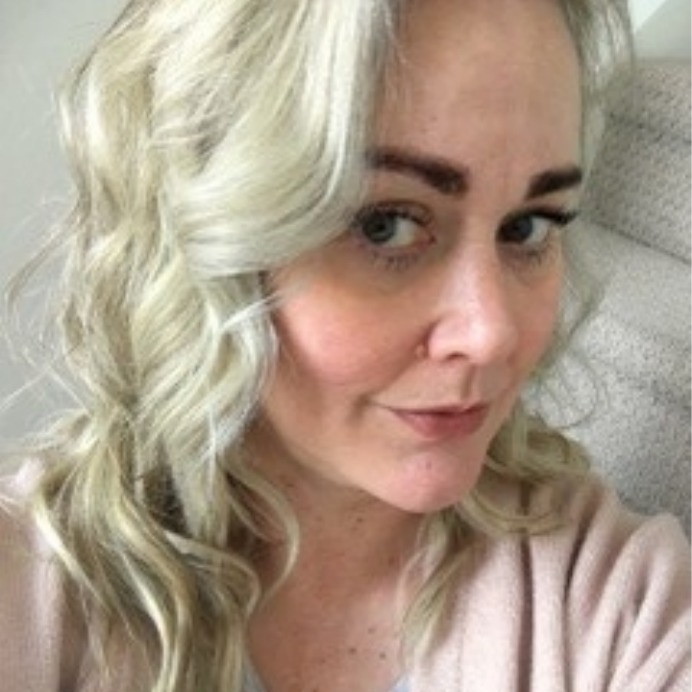By Adriana Ermter
In our monthly column, senior writer and editor Adriana Ermter shares her personal experiences with breast cancer.
A breast cancer diagnosis can leave you feeling winded, like you’ve been socked in the stomach and can’t breathe, or even think for that matter. That’s how I felt. I had no emotion, no tears and no anger when I first heard the words “you have breast cancer.” My mind and body simply froze and everything around me, including my mind, went hazy. I attribute this now to shock, which, in my opinion, is a fairly reasonable reaction to receiving such life-changing news. And while the haziness eventually wore off, the surrealness of my new reality remained overwhelming.
I fought this by going into overdrive. I did research, wrote lists of questions, bought groceries, remained matter of fact, cleaned my house, snuggled my cat, ordered cozy sweatpants online, got my hair cut, did more research, added questions to my list and powered through. But not once did I talk to someone about how I was feeling. Not even my therapist. At the time I just couldn’t. To talk about my feelings wasn’t possible. Heck, I barely shared, except to a small handful of my closest family and friends, that I had cancer. I’d kicked into survival mode and didn’t have the time or the energy to deal with how I was feeling or have people ask me how I was feeling. Except, in hindsight, maybe I should have spoken to a professional psychotherapist. It would have added a layer of support I could have leaned on. Eventually, I did tap into my therapist and let everything pour out of me. It was cathartic and helped me feel less isolated and alone.
Having gone through my own diagnosis, treatment, and the aftermath, I know the incredible strength and resilience women who are diagnosed with breast cancer require. It’s immense and the journey is debilitating, both physically and emotionally. Having someone to confide in, to listen and to lend kindness and support is so beneficial. So, here are five free psychotherapy-based resources you can access at any time to give you the emotional reprieve you need.
1. Cancer Support Helplines: A Lifeline of Compassion
The Canadian Cancer Society's helpline (1-888-939-3333) and the Rethink Breast Cancer helpline (1-800-563-0238) offer compassionate, confidential support from trained professionals. These helplines serve as a safe space to express your fears, anxieties, and questions. Speaking with someone who understands the unique challenges of a breast cancer diagnosis can provide you with a profound sense of relief and connection. I wish I’d known about these helplines when I was first diagnosed.
2. Support Groups: Finding Your People
Breast cancer support groups are a terrific resource because they are comprised of women like us, who know and understand what it’s like to navigate this crazy-stupid and difficult journey. These groups are often facilitated by mental health professionals and can provide a platform for sharing experiences and feelings with our people—women and men who are in or have been through similar circumstances. Organizations like the Canadian Breast Cancer Network (CBCN) offer a list of virtual support groups, including their own, ensuring accessibility for all individuals dealing with breast cancer. Being part of a support group can help you feel less alone, more empowered and part of an inclusive, accepting, understanding and non-judgemental community.
3. Individual Therapy: Private Healing
Sometimes, a one-on-one approach is the most effective way to address the emotional toll of a breast cancer diagnosis. I know this was my favoured route, as it allowed me the safe space to unleash my most warranted and ridiculous thoughts without the fear of judgement or worse, having someone try to “fix” me. Many Canadian provinces offer free access to psychotherapy through publicly funded programs, such as Ontario's Mental Health and Addictions Program. These services can provide personalized support and help you develop coping strategies, manage anxiety and depression, and navigate the complexities of your diagnosis and treatment. Individual therapy is confidential and promotes emotional healing and growth.
4. Online Resources: Anonymous and Accessible 24/7
Both Rethink Breast Cancer and the CBCN offer a wealth of information and educational materials, including articles, webinars, and interactive tools. These resources can help you gain a better understanding of your diagnosis, treatment options, and the emotional aspects of breast cancer. For me, having access to this knowledge was and continues to be incredibly beneficial, especially when I feel as though I’m receiving cookie-cutter responses from my oncology team, who, in fairness, don’t have hours on end to speak with me. Sadly, there are still too many women diagnosed each day for this one-on-one care. According to the Canadian Cancer Society, 78 women are diagnosed with breast cancer every day. I believe that arming yourself with knowledge helps you feel more in control of what you are going through and as a result, more positive about your future.
5. Meditation: Psychological Self-care
The mind-body connection is powerful and harnessing it through meditation can be a transformative tool for managing stress and anxiety. At least it is for me. Now, I’m not an “ommm” kind of meditator, but I do spend about 15 to 90 minutes each morning, right after I wake up, focusing on how I want to feel that day. I read pages in books, mostly autobiographies of people who inspire me, write in my journal, add drops of my favourite essential oils into my diffuser, and envision the future I want to live—all in my pyjamas. This me-time sets me up for my day, fuels me with positivity and gives me a sense of peace. I can’t control what has happened to my body, but I can choose to find proactive ways to think and feel, so I do. Many organizations, including the Canadian Cancer Society, offer free guided mindfulness and meditation sessions. These practices can help you regain a sense of calm, reduce treatment-related side effects, and improve overall well-being.
Adriana Ermter is a multi award-winning writer and editor. Her work can be read in Figure Skater Fitness, Sotheby’s Insight, Living Luxe and IN Magazine, as well as online at 29Secrets.com, RethinkBreastCancer.ca, Popsugar.com and AmongMen.com. The former Beauty Director for FASHION and Editor-in-Chief for Salon and Childview magazines lives in Toronto with her two very spoiled rescue cats, Murphy and Olive. You can follow Adriana on Instagram @AdrianaErmter









